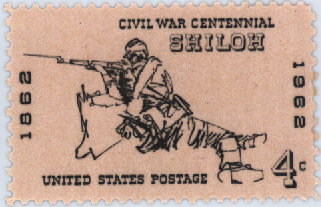FRtR > Outlines > American History (1990) > Chapter Five > Bloody battles in East and West (8/12)
An Outline of American History (1990)
Chapter Five
Bloody battles in East and West (8/12)
< Previous Page * Next Page >
Most of the navy, at the war's beginning, was in Union
hands, but it was scattered and weak. Secretary of the Navy
Gideon Welles took prompt measures to strengthen
it.
Lincoln
then proclaimed a blockade of the southern coasts. Although the
effect of the blockade was negligible at first, by 1863 it was
almost completely preventing shipments of cotton to Europe and
the importation of munitions, clothing, and the medical supplies
the south sorely needed.
Meanwhile, a brilliant naval commander,
David Farragut
had conducted two remarkable operations. In one, he took a
Union fleet into the mouth of the Mississippi, where he forced
the surrender of the largest city in the south, New Orleans. In
another, he made his way past the fortified entrance of Mobile
Bay, captured a Confederate ironclad vessel, and sealed up the
port.
In the Mississippi Valley, the Union forces won an almost
uninterrupted series of victories. They began by breaking a long
Confederate line in Tennessee, thus making it possible to occupy
almost all the western part of the state. When the important port
of Memphis
on the Mississippi was taken, Union troops could
advance some 320 kilometers into the heart of the Confederacy.
With the tenacious General Ulysses S. Grant
in command, Union
 forces
made a sudden attack at Shiloh,
on the bluffs overlooking
the Tennessee River, and held stubbornly until reinforcements
helped repulse the Confederates. Grant then pushed slowly but
steadily southward, with the paramount object of gaining
complete control of the Mississippi, the lower reaches of which had
been cleared of Confederates by Farragut's capture of New Orleans.
forces
made a sudden attack at Shiloh,
on the bluffs overlooking
the Tennessee River, and held stubbornly until reinforcements
helped repulse the Confederates. Grant then pushed slowly but
steadily southward, with the paramount object of gaining
complete control of the Mississippi, the lower reaches of which had
been cleared of Confederates by Farragut's capture of New Orleans.
For a time, Grant was blocked at Vicksburg,
where the
Confederates had strongly fortified themselves on bluffs too high
for naval attack. Then, in 1863, he began to move below and
around Vicksburg, subjecting the position to a six-week siege.
On July 4, he captured the town, together with the strongest
Confederate army in the west. The river was now entirely in
Union hands. The Confederacy was broken in two, and it became
almost impossible to bring supplies from Texas and Arkansas.
In Virginia, on the other hand, Union troops had met one
defeat after another. In a succession of bloody attempts to capture
Richmond,
the Confederate capital, Union forces were repeatedly
thrown back. The Confederates had two great advantages: strong
defense positions afforded by numerous streams cutting the road
between Washington and Richmond; and two generals, Robert
E.
Lee and Thomas J. (Stonewall) Jackson,
both of whom far surpassed the early Union commanders. One Union general,
George McClellan, made a desperate attempt to seize
Richmond.
But in
the Seven Days' Battles of June 25 to July 1, 1862, the Union
troops were driven steadily backward, both sides suffering terrible
losses.
< Previous Page * Next Page >
 forces
made a sudden attack at Shiloh,
on the bluffs overlooking
the Tennessee River, and held stubbornly until reinforcements
helped repulse the Confederates. Grant then pushed slowly but
steadily southward, with the paramount object of gaining
complete control of the Mississippi, the lower reaches of which had
been cleared of Confederates by Farragut's capture of New Orleans.
forces
made a sudden attack at Shiloh,
on the bluffs overlooking
the Tennessee River, and held stubbornly until reinforcements
helped repulse the Confederates. Grant then pushed slowly but
steadily southward, with the paramount object of gaining
complete control of the Mississippi, the lower reaches of which had
been cleared of Confederates by Farragut's capture of New Orleans.